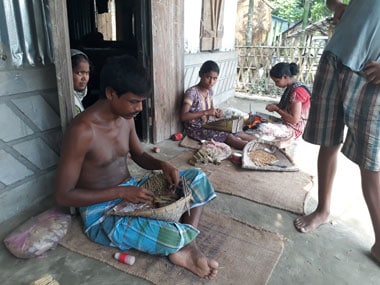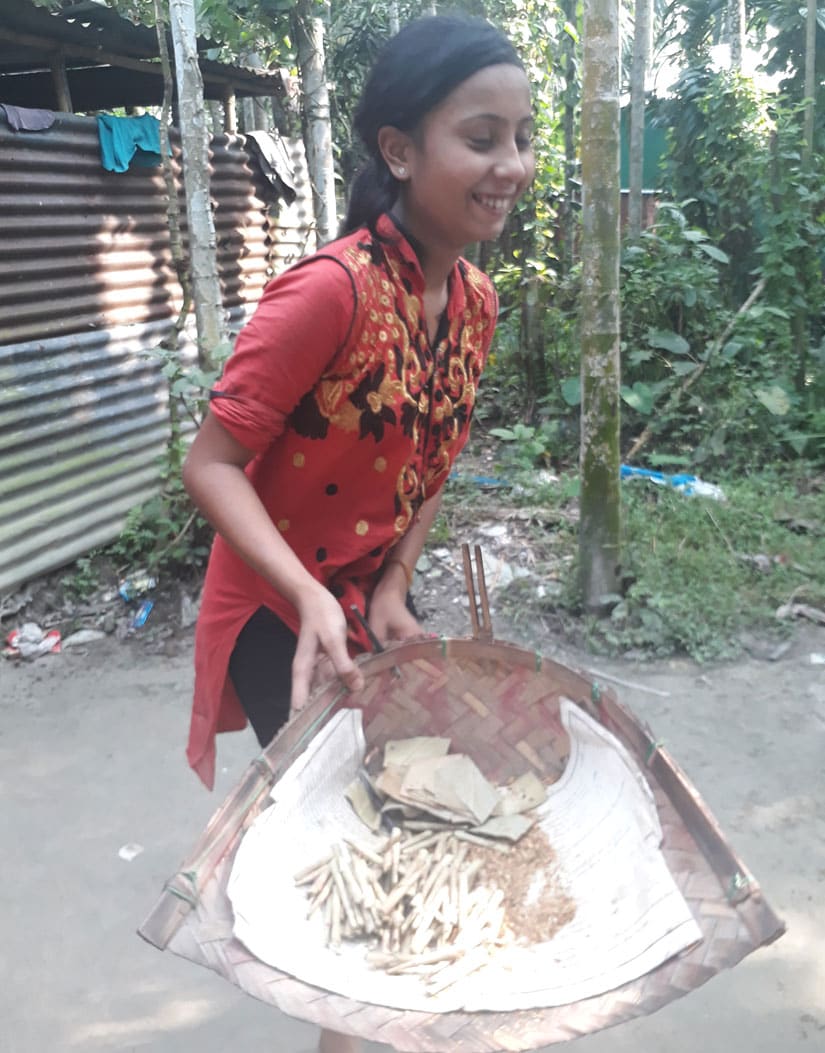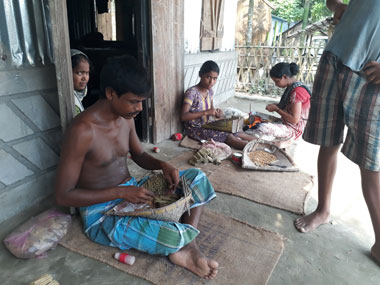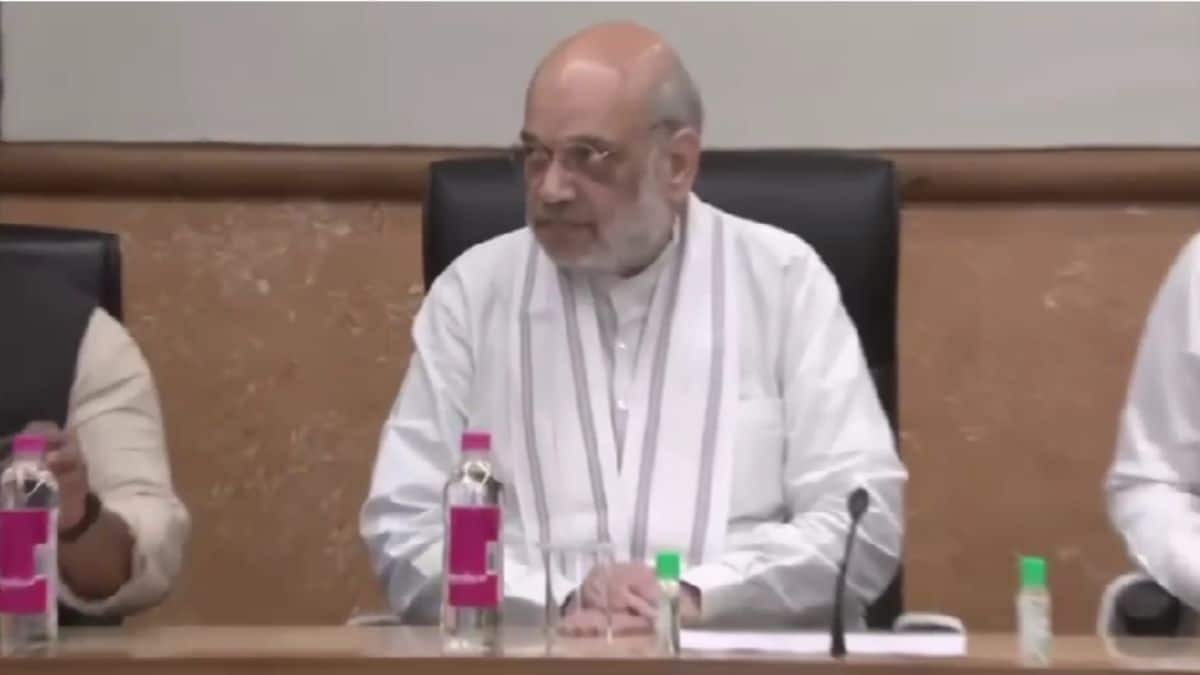Editor’s note: The people of Assam have been affected to varying degrees by the floods. Many in the state depend on agriculture for livelihood but are forced to take other ventures when floods repeatedly ravage their farmland. This is the second in a three-part series on how various people in the state are coping with the floods. Guwahati: All of 11, Sunita Mali of Khakrabai village in Assam rolls about a thousand beedis every day. She quit school in class 5 so she could roll beedis and supplement her family’s income. Her mother Rupa says Sunita learnt to roll beedis on her own.[caption id=“attachment_4133865” align=“alignleft” width=“380”]  Ananda Rai, 40 his wife Madhu Rai, 25 and daughter Tarani Rai, 10 busy making beedi in their home in Baniamari village of Sahebganj Gaon Panchayat. Image courtesy Syeda Ambia Zahan[/caption] “It wasn’t always like this. We had enrolled both our children in school. But after 2012, everything changed,” she says. “The flood kept washing our land away and then finally we had nothing left. My husband decided that we could no longer feed ourselves just by farming. So we began rolling beedis.” In Dhubri, one of the worst flood-hit districts of Assam, the sight of women and children sitting in verandas outside their homes and rolling beedis is not uncommon. Firstpost visited all the 10 villages of Sahebganj in Golokganj revenue circle in Dhubri and found that almost all households were engaged in beedi rolling. The Gangadhar river, which originates in Bhutan, flows for 33 km in Dhubri and is responsible for massive floods, especially causing huge destruction in the Golakganj revenue circle of the district. With most of the population engaged in farming of paddy and jute, the villagers always live in the fear of their produce being destroyed and their land being washed away. “Depending on farm produce to fill our stomachs was not practical for us. Beedi rolling is cheaper, easier and more secure,” explains Rupa. Apela Bibi, the president of Sahebganj Panchayat, estimates that the last three to four years have seen a sharp rise in the number of beedi rollers in the villages. She says there are about 9,000 people in Sahebganj panchayat and 70 percent of them earn a living by rolling beedis. “It is because due to flood every year, people do not want to pursue agriculture as they have been facing a heavy loss for the past 10 years. So they have taken up beedi production. It does not cost much. The blended tobacco and the rolling leaves are provided by the agents,” she says. As per the report of Assam State Disaster Management Authority, last updated on 19 August, 6,204 hectares of crop area was damaged in 430 villages in six revenue circles of Dhubri district during the recent flood. Suleiman Ali, 52, from Baniamari village in Sahebganj lost his ancestral land spanning 10 acres in the flood that hit the state in 2012. He explains that at first after the flood waters ruined his paddy farm and left behind sand, he decided to cultivate groundnut. “That year, through my groundnuts farm, I made a profit of Rs 60,000, double the amount of what I used to make from paddy farming. I was very happy but in the floods that hit the village in 2013, the river washed away six acres of my land. I was left with nothing, again!” he says. He adds that the responsibility to feed his family led him to a meeting with JN Thakuria, a middle agent who would supply raw materials to beedi rollers in the village. “Now, all six members of my family, including my brother, my wife and daughter, roll beedis. We earn Rs 20,000-25,000 a month. I am very happy,” he says. These middle agents who act as a bridge between the villagers and the beedi companies visit the villagers every day and hand over raw material, which includes tobacco, rolling leaves and thread. The agent gives each of them a daily task and makes sure to collect the said number of beedis at the end of the day. JN Agarwala, a local agent associated with Assam Beedi Factory, a beedi-rolling unit in Dhubri, has the contract for Khakrapara village. He says the villagers roll more than three lakh beedis every month. Agarwala adds that the districts that are worst affected by the floods, such as Golokganj, Chapor Bilashipara, Agomani and Dhubri, produce the highest number of beedis. [caption id=“attachment_4133883” align=“alignleft” width=“825”]  Mithu Mali, 14, showing the beedis she rolled by that time of the day. Image courtesy Syeda Ambia Zahan[/caption] At present, Dhubri has eight registered beedi-making units across the district but this number is higher with many small units not registering themselves. According to the Lower Assam Beedi Labourers’ Association, the factory owners do so to avoid paying the minimum wages prescribed by the government and provide due facilities to the workers. According to the 2015 notification released by the Labour and Employment Department of Assam, minimum wages for unskilled workers employed for beedi rolling is Rs 240 per day and Rs 7,200 per month. Hemanta Debnath, the president of the association, says there is a violation of labour laws by the agents and beedi unit owners. He explains that agents lure villagers who have been severely affected by floods into the beedi rolling. “Even though the villagers work through the day, they do not get the fixed wages commissioned under the law… For every 1,000 beedis, they get Rs 100-120 rupees, after doing backbreaking work for at least 15 hours a day,” he says. Firstpost verified this with villagers and found that Rupa, who starts works at 5 am ends it only in the evening. She has a target to roll 1,000 beedis in a day and only then will she earn Rs 100-120. This rate too fluctuates depending on the rate of the raw material that day. Dropout rate increasing in schools With workers being paid for every beedi rolled, most families force their children to roll beedis to earn extra money. According to a survey conducted by the Committee on Welfare of Women and Children tabled in Assam Legislative Assembly in 2016, more than 15,000 children in the state are employed in hazardous and non-hazardous industries. The report says that 4.9 percent children between the ages of five-14 years are engaged in some form of child labour higher than the national average of 4.5 percent. It further adds that a chunk of them are into beedi rolling. When Firstpost visited the Sahebganj Middle English School, the headmaster Mon Bhai Rai said the dropout rate in the school has been steadily increasing for the last three years. According to him, in 2014, the school had 257 students but now only 150-160 students attend school regularly. “Though these students are still enlisted in the school register, they stop coming to school after class fourth or fifth. When we enquire, the children say their parents want them to roll beedis instead of wasting time studying,” he says. He adds that parents prefer children rolling beedis because they are faster and better. “Because their hands are small and swift, they are able to roll beedis more efficiently and roll more beedis than the adults. For every 1,000 beedis a day, they are set to make an extra amount of Rs 3,000 per month,” he says. Miguel Das Queah, noted child rights activist, said the Child Labour Act suffers from several flaws, which gives way to children being employed in various activities and letting the employers go unharmed. “While the Act prohibits employment of children in any hazardous or non-hazardous occupation and lists beedi production as being hazardous it permits child labour in family or family enterprises. And since most of the children are made to work by their families, it becomes unpunishable,” he says. Also read Assam floods aftermath Part 1: Displaced sections of minority community fear being termed as illegal citizens Watch this space for the third and final part of the series on Thursday. The author is a Guwahati based freelance writer and a member of 101Reporters.com, a pan-India network of grassroots reporters.
The Gangadhar river, which originates in Bhutan, flows for 33 km in Dhubri and is responsible for massive floods, especially causing huge destruction in the Golakganj revenue circle of the district.
Advertisement
End of Article


)

)
)
)
)
)
)
)
)



